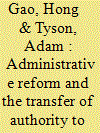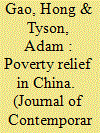| Srl | Item |
| 1 |
ID:
156609


|
|
|
|
|
| Summary/Abstract |
In this article, we examine the administrative functions that have been carried out by social organizations (SOs) in China since 2013. We use evidence from Guangdong to demonstrate that the transfer of authority to SOs is selective, tends to create more burdens for local government, and generally does not lead to greater autonomy for SOs. We focus on five types of SOs that are undertaking new administrative functions with varying degrees of operational autonomy, which relates to the consultative authoritarian model proposed by Jessica Teets. Consultative authoritarianism allows for the expansion of relatively autonomous SOs and the development of indirect state control mechanisms. The model is designed to improve governance without democratization by expanding the role played by intermediaries such as SOs in public administration and service delivery. The evidence from Guangdong permits us to conclude that the transfer of authority to SOs allows for innovations in public administration, but that politics continues to motivate government decisions as to which functions are suitable for SOs to undertake, casting doubt on the ability of the Chinese Communist Party to achieve sustainable improvements in local governance and public service provision.
|
|
|
|
|
|
|
|
|
|
|
|
|
|
|
|
| 2 |
ID:
192628


|
|
|
|
|
| Summary/Abstract |
Under President Xi Jinping, the strengthening of the Chinese Communist Party's political control occurs in conjunction with an evolving administrative role for government-affiliated associations. Analysing associations that are subordinate within China's strict hierarchy but which have degrees of operational freedom yields insights into the changing nature of public service and administration in China. Evidence from 63 interviews conducted from 2018 to 2022 with government departments and affiliated associations in the education sector reveals the complexity of state control and degrees of constrained autonomy achieved by affiliated associations. The government exerts control over financing, personnel appointments and core business activities but, over time, associations gain varying degrees of operational autonomy to influence the education agenda and fill gaps in public services. The interdependency and relational variance we find in the case of Ministry of Education-affiliated associations contributes to broader understandings of the complex and fragmentary nature of the Chinese state and public administration.
|
|
|
|
|
|
|
|
|
|
|
|
|
|
|
|
| 3 |
ID:
174783


|
|
|
|
|
| Summary/Abstract |
Evidence from Gansu, Hunan, Shandong, and Yunnan provinces shows that subnational authorities in China draw on personal relations to alleviate poverty and legitimize their rule. Through an invasive process of claiming kin, local government officials are required to sign kinship contracts with poor households. The contract links bureaucratic performance reviews to tangible outcomes, creating new incentives and pressures for officials to help lift their adopted families out of poverty. The general aspiration may be to improve bureaucratic processes by establishing direct, transparent connections between state and society, however the authors contend that the invasive and personalized nature of the kinship policy risks disrupting the existing social order and complicating local poverty relief efforts, leading to local variance, extortion and other irregularities.
|
|
|
|
|
|
|
|
|
|
|
|
|
|
|
|